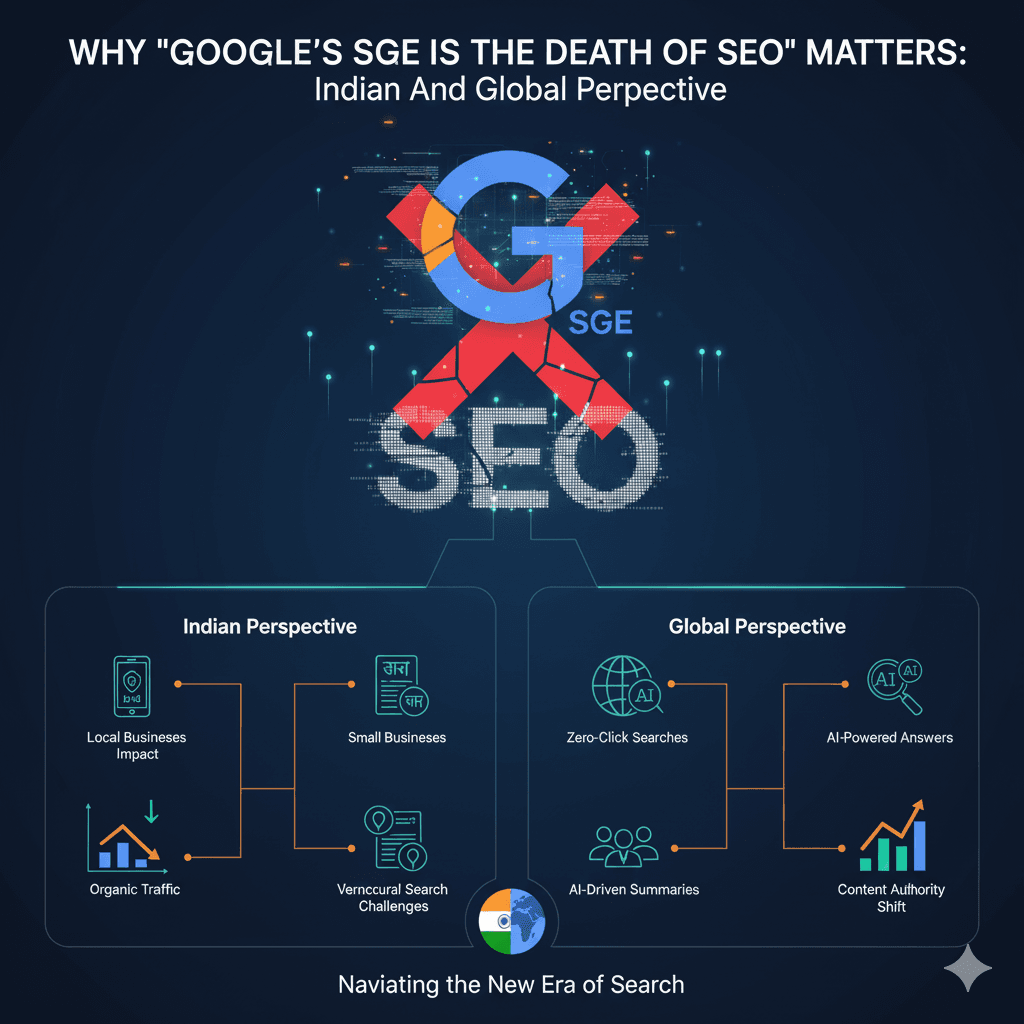
13 Nov 2025
The world of digital marketing is experiencing its most significant shift in a generation. Now with Google SGE (Search Generative Experience) leading the way of how search will be in the future, you’re starting to hear businesses, students and marketers alike asking this question: Is SEO really dead?
We’ll break down in this article how SGE SEO changes everything, from AI-first snippets and zero-click content to personalisation, conversational search, and entity-first indexing. And, most importantly, we’ll demonstrate how platforms such as Edysor.ai can accelerate ambitious learners and education businesses in the new AI-powered world.
India being one of the fastest moving digital economies – where millions of small businesses, education consultancies, startups are majorly dependent on organic visibility SEO and SGE are important. Below are the type of people who have earned a living on traditional SEO:
For India, where digital literacy and budget considerations are all a learning curve, this transition remains both challenge and opportunity. Businesses and consultancies who utilize AI-first publishing platforms such as Edysor.ai can stay ahead.
This is a worldwide revolution that makes SEO as we knew it completely unrecognizable. By acknowledging the salience of this issue, both Indian businesses and international institutions can devise strategies rather than wait to be confronted with fait accompli in the era of AI answers.
Google’s Statement Generating Engine is an AI-based layer integrated into Google Search. It doesn’t provide you with a list of links, but rather delivers conversational AI responses right at the top of the results page.
In other words, SGE SEO rewrites the rules: websites are no longer jockeying for rank one—they’re trying to get seen.
For over 20 years, the formula for classic SEO has been pretty simple: find the right keywords, make content relevant to your keyword targets and then optimize that content via its structure, UI signals and images (with LSI or latent semantic indexing). Brands and companies poured money into tactics like on-page SEO, technical changes, and content marketing in its attempt to secure the highly coveted first page results.
However, the traditional model is being upstaged in the face of the new Google Search Generative Experience (SGE) and they’ve never been done like this before. So, let’s dissect just how SGE results in what many are referring to as the death of SEO era.
In the former SEO:boon model, the path to traffic was simply to rank on page one. Even if they had to jump and read through a few selections, sites had a reliable CTR. With SGE SEO, all of that changes. From then on, powered or AI-driven snippets by Google bring full conversational answers right inside the SERP. Instead of clicking around, users find what they need directly from the AI box. This drops CTR significantly because users never make it to the sites that are creating that information.
The result is a paradox marketers have increasingly found themselves in: Google needs high-quality content to train its AI answers — and yet, once it extracts those answers, it doesn’t always send traffic back to the creators. This process — which is perhaps best described as content cannibalization — basically means that Google is “using” your content but not rewarding you with the clicks. There's just not the SEO value you used to get by producing blogs or guides here because of the exposure, even though it’s technically quoting your content via AI.
Multiple sources battled for visibility, clear back in the pre-SGE days. A keyword search might turn up dozens of results, many emanating from multiple blogs, research papers and news sites. This race opened the doors for businesses, small or large, to establish their digital presence. But in the era of AI summaries, it seems references could well be passé. Instead, Google offers a synthesized answer. The consequence? The competitive model of SEO collapses, for there are now fewer websites that can be featured – and the fed AI gobbles up the attention.
While static search rankings could be easily monitored, AI answers are not so static. That means the answer you see to a question can change in an instant based on user intent, context or immediate follow-up questions. Classic SEO was about monitoring ranking positions in relation to time, devising plans and measuring gains. When you are using conversational AI interaction on SGE, reply positions can change on the fly. This uncertainty makes it virtually impossible to rank or protect a long-term SEO position like you used to be able to.
Together, these changes have caused marketers to use the phrase “SEO death era” — an era in which old school strategies and tactics for ranking no longer work. Rather than relying on placement of a keyword and how many backlinks a brand has, brands need to start thinking about SGE SEO strategies: creating content that’s conversational, entity first and optimized for Google’s generative AI.
That’s not to say content creation is kaput — but the rules for it have changed dramatically. This fight is no longer just about rankings, but about relevance within Google’s own AI drawled narrative. Businesses and consultancies that fail to adapt risk slipping into digital obscurity, while the ones adhering to AI-ready optimization flourish in this new era.
Instead of fighting for featured snippets, SGE SEO makes every snippet AI-generated. Websites must optimize for inclusion within AI narratives rather than rankings alone.
Imagine 60–70% of user queries never leaving Google. Businesses invested in traditional SEO feel the pinch since AI answers satisfy user needs instantly.
Goodbye generic content. SGE SEO demands entity-first, conversational writing—content must sound natural, human-like, and tailored to intent.
Google wants structured clarity. Schema markup, verified expertise, and semantic optimization now take priority.
For students searching “best universities in Canada for MBA,” SGE gives them a concise, generative answer (AI answers) rather than directing them to listings.
This SEO death threatens consultancies that relied on organic rankings. However, the flip side is clear: SGE SEO rewards those who build conversational, AI-enhanced content experiences.
If you’re a student consultancy or an education brand, adopting SGE-oriented content strategies is no longer optional. That’s where Edysor.ai steps in.
With Edysor.ai, your consultancy doesn’t just survive the age of SGE SEO; it thrives by creating entity-first, AI-ready blogs.
Meet Rina, a student from Udaipur, India, who wanted to explore MS opportunities in Germany. Traditionally, she would Google “Best MS programs in Germany,” shuffle through 10 links, and browse endless forums.
With SGE, Google gave her a generative summary with only a snippet of information. Luckily, Rina’s consultancy was powered by Edysor.ai blogs optimized for SGE-first visibility. Her query led her directly to Edysor’s content piece, where she discovered:
Today, Rina is enrolled at her dream German institute—all thanks to content visibility in the SGE SEO era.
Prior to adopting the cutting-edge AI tools, education consultancies and digital marketers encountered a few stumbling blocks in the SGE SEO space:
These obstacles showed how necessary it was for the development of a new content generation system, free from plagiarism and high speed, in order to keep up with the era of SEO death led by SGE.
Once deployed, Blog AI re-writes the rulebook for how consultancies and enterprises engage with content in the SGE SEO landscape.
With Blog AI, consultancies can remain visible in the age of SGE SEO and even leverage an unmatchable advantage against those who continue to rely on yesterday’s SEO.
(Answers: b, a, a)
Q1. Will SGE SEO completely kill traditional rankings?
Yes, gradually. AI answers lower the need for traditional link-based organic results.
Q2. Can my student blog still rank in an SGE world?
Yes, but only if you optimize content entity-first and conversational. Platforms like Edysor.ai make this possible.
Q3. How can students benefit from SGE SEO?
They get faster, more relevant, and contextual AI-supported learning resources without digging into dozens of links.
The traditional SEO that we knew is rapidly dying to be replaced by AI-dominant SGE (Search-Google-Answer) SEO where zero-click search has already changed user behavior. For a lot of companies this will be an SEO death moment, however in fact it’s actually the beginning of a fresh new era.
For students and consultancies in India and abroad, this is hugely significant. Keywords cannot hope to be the only way of securing organic traffic. The future is about producing entity-first, conversational, AI-friendly content that fits well with what Google's focus on SEO has become.
That’s where Edysor.ai is the best partner. By using Blog AI – with its AI-generated blogs, repurpose engines, podcast creation and video dab hands and plagiarism-free pads – you can still keep shining in SGE SEO’s follow spotlight today.
Indeed, rather than be scared of the SEO death, education brands and students alike can celebrate it as not an end but a new beginning, one driven by AI and machine learning.
Call-to-Action:
Ready to future-proof your content in this new world of AI answers? Explore Edysor.ai today and step confidently into the era of SGE SEO.
1. What does SGE SEO mean for digital marketers?
It redefines SEO where users stay on Google, consuming AI-generated content rather than exploring websites.
2. Why is it being called the SEO death era?
Because SGE drastically reduces CTR and traffic flow to websites, impacting businesses heavily reliant on SEO.
3. How can education consultancies adapt?
By using AI-driven platforms like Edysor.ai to create entity-first, conversational, and SGE-optimized content.
4. Is SEO dead or evolving?
SEO is not gone, but it has evolved into SGE SEO—the future lies in AI-first content.
5. How does Edysor.ai stand out?
Its Blog AI offers a one-stop solution for AI-driven blogs, content repurposing, and cross-channel publishing, ensuring continued visibility in the age of AI answers.
By Gunjan Pancholi, Co-Founder & AI Solutions Architect, Edysor.ai | Driving Innovation in Custom GPTs, Voice Agents & Social Bots | Product Strategist | Tech Visionary | Leading R&D in EdTech & Study Abroad Automation | Growth-Focused
LinkedIn Profile: https://in.linkedin.com/in/gunjan-pancholi-216171263
Resources
Others
All rights reserved. Powered by Edysor
